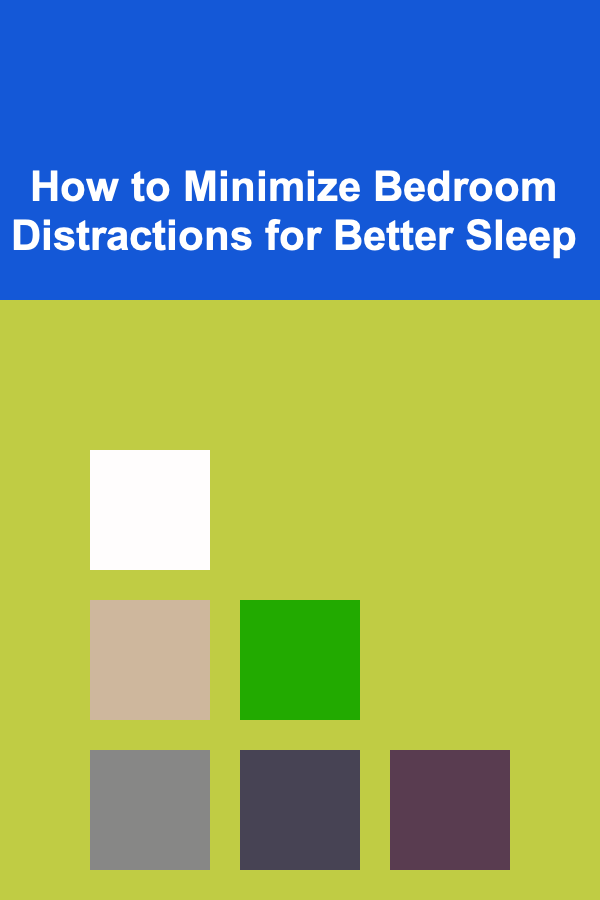
How to Minimize Bedroom Distractions for Better Sleep
ebook include PDF & Audio bundle (Micro Guide)
$12.99$5.99
Limited Time Offer! Order within the next:

Sleep is essential for our overall health and well-being, yet many people struggle to obtain the restful sleep they need. One significant factor affecting sleep quality is distractions within the bedroom environment. By minimizing these distractions, you can create a peaceful sanctuary conducive to better sleep. This comprehensive guide explores various strategies and techniques to minimize distractions in your bedroom, leading to improved sleep quality and overall health.
Understanding the Importance of Sleep
The Role of Sleep in Health
Sleep is vital for numerous bodily functions, including:
- Physical Health: Sleep helps repair muscles, synthesize proteins, and release hormones.
- Mental Clarity: Quality sleep enhances cognitive function, memory consolidation, and learning abilities.
- Emotional Well-being: Adequate rest supports emotional regulation and stress management.
The Consequences of Poor Sleep
Chronic sleep deprivation can have serious effects on health, such as:
- Increased risk of chronic conditions (e.g., obesity, diabetes, cardiovascular disease).
- Impaired cognitive function, leading to difficulty concentrating.
- Heightened anxiety and mood disorders.
Recognizing the importance of sleep is crucial to understanding why minimizing distractions in the bedroom is so essential.
Identifying Common Bedroom Distractions
Noise
External noise can disrupt your sleep cycle, making it difficult to fall or stay asleep. Common sources of noise include:
- Traffic sounds
- Neighbor activities
- Household appliances
Light
Exposure to light in the evening can interfere with your body's natural sleep-wake cycle. Sources of unwanted light may include:
- Streetlights
- Electronics with bright screens
- Ambient light from other rooms
Clutter
A cluttered bedroom can create mental distractions, making it harder to relax. Items that contribute to clutter may include:
- Piles of clothes
- Unorganized accessories or books
- Miscellaneous items strewn about
Temperature
Sleeping in an uncomfortable temperature can lead to restless nights. Factors to consider include:
- Insufficient heating during winter months
- Excessive heat in warmer seasons
- Poor ventilation
Technology
Smartphones, tablets, and laptops can be major distractions in the bedroom. Their blue light can suppress melatonin production, making it harder to wind down before sleep.
Creating a Sleep-Inducing Environment
Lighting
Choose Soft Lighting
Incorporate soft, warm lighting fixtures like lamps or sconces instead of harsh overhead lights. Consider using dimmable bulbs to adjust brightness according to your needs.
Block External Light
Opt for blackout curtains or shades to block out streetlights and early morning sun. If total darkness is challenging, consider using sleep masks.
Sound
Use White Noise
White noise machines or apps can help mask disruptive sounds by providing a consistent auditory backdrop. Sound options may include:
- Nature sounds (rain, ocean waves)
- Gentle music
- Traditional white noise
Soundproofing
Consider soundproofing solutions if external noise is persistent. These may include:
- Weather stripping doors and windows
- Adding acoustic panels to walls
- Using rugs or carpets to absorb sound
Temperature
Optimal Sleeping Temperature
Most experts recommend keeping your bedroom temperature between 60°F and 67°F (15°C to 19°C). Adjust bedding and clothing to accommodate seasonal changes while maintaining comfort.
Ventilation
Ensure proper airflow in your room through open windows or fans. Good ventilation can regulate temperature and improve air quality, promoting better sleep.
Furniture Arrangement
Create a Functional Layout
Arrange furniture to promote a sense of calm and ease; avoid placing your bed near windows or doorways. Here are some layout tips:
- Position the bed against a solid wall for stability and support.
- Ensure there's enough space to move around comfortably.
Designated Zones
Consider creating designated zones for different activities, such as sleeping, reading, and working. This can help reinforce boundaries between relaxation and distraction.
Decluttering Your Space
Assess Your Belongings
Take inventory of items in your bedroom. Evaluate which items you truly need and which can be removed or relocated.
Implement Organization Systems
Utilize storage solutions to keep your belongings organized. Options may include:
- Baskets and bins: Categorize items, such as accessories, books, or seasonal clothing.
- Shelving units: Use vertical space for additional storage while keeping surfaces clear.
Regular Maintenance
Set a regular cleaning schedule to prevent clutter from accumulating again. Tidying up weekly ensures your space remains inviting and organized.
Managing Technology
Establish Tech-Free Zones
Create a technology-free zone by removing devices like smartphones, tablets, and laptops from your bedroom. Consider designating charging stations outside the bedroom to limit screen time before sleep.
Limit Screen Time Before Bed
Aim to disconnect from screens at least 30-60 minutes before bedtime. Instead, engage in calming activities that prepare your body for sleep, such as reading a book or practicing mindfulness.
Use Night Mode Features
If you must use devices before bed, enable night mode features or applications that reduce blue light exposure. This can help minimize disruption to your sleep-wake cycle.
Establishing a Pre-Sleep Routine
Wind Down
Develop a pre-sleep routine to signal to your body that it's time to relax. Activities may include:
- Taking a warm bath
- Practicing gentle yoga or stretching
- Reading a physical book or magazine
Consistent Timing
Aim to go to bed and wake up at the same time every day, even on weekends. Consistency reinforces your body's internal clock, promoting better sleep quality.
Mindfulness Practices
Incorporate mindfulness practices into your routine, such as meditation or deep breathing exercises. These can help calm racing thoughts and prepare your mind for rest.
Using Sleep Aids Wisely
Natural Sleep Aids
Consider natural sleep aids that can promote relaxation, such as:
- Herbal teas: Chamomile, valerian root, and lavender teas can enhance relaxation.
- Essential oils: Diffusing calming scents like lavender or cedarwood can create a soothing atmosphere.
Over-the-Counter Supplements
If necessary, consult with a healthcare professional about taking over-the-counter sleep aids or supplements, such as melatonin. However, prioritize non-pharmaceutical approaches when possible.
Mindfulness and Relaxation Techniques
Progressive Muscle Relaxation
Practice progressive muscle relaxation by systematically tensing and relaxing each muscle group in your body. This technique can promote physical relaxation and alleviate tension before sleep.
Guided Imagery
Visualizing calming places or scenarios can help redirect your focus away from daily stressors. Picture serene landscapes or peaceful settings to facilitate relaxation.
Breathing Exercises
Deep breathing exercises can reduce anxiety and promote relaxation. Try inhaling deeply through your nose for four counts, holding for four counts, and exhaling through your mouth for four counts.
Common Mistakes to Avoid
Ignoring Sleep Hygiene
Neglecting basic sleep hygiene principles, such as maintaining a clean and comfortable sleep environment, can hinder your ability to relax.
Inconsistent Sleep Schedule
Frequent changes to your sleep schedule can disrupt your body's internal clock. Strive for consistency to improve sleep quality.
Relying Solely on Sleep Aids
While sleep aids can be helpful, relying solely on them without addressing underlying issues may lead to dependency. Focus on holistic approaches to improve sleep habits.
Conclusion
Minimizing distractions in your bedroom is essential for achieving better sleep quality. By creating a sleep-inducing environment, managing technology, establishing a pre-sleep routine, and incorporating mindfulness techniques, you can transform your bedroom into a peaceful sanctuary.
Remember that improving your sleep is a journey that requires patience and commitment. By taking deliberate steps to address distractions, you'll cultivate healthier sleep habits and ultimately foster a more restorative and rejuvenating nightly experience. Embrace the process, and enjoy the countless benefits that come with restful sleep!
Reading More From Our Other Websites
- [Organization Tip 101] How to Create a Charity Challenge to Inspire Donations
- [Home Rental Property 101] How to Write a Lease Agreement That Protects You and Your Property
- [Stamp Making Tip 101] Best Eco‑Friendly Materials for Handmade Rubber Stamp Crafting
- [Home Renovating 101] How to Select the Perfect Shower Tile Trends for a Spa-like Bathroom Renovation
- [Screen Printing Tip 101] DIY vs. Professional Frames: Which Screen Printing Frame is Right for You?
- [Personal Investment 101] How to Use Silver ETFs to Diversify Your Investment Portfolio
- [Home Soundproofing 101] How to Enhance Soundproofing with Green Materials
- [Personal Financial Planning 101] How to Reduce Financial Risk in a Volatile Market
- [Personal Care Tips 101] How to Use Body Butter to Treat Dry, Cracked Skin on Hands and Feet
- [Home Rental Property 101] How to Create a Desirable Pet-Friendly Rentals Policy That Protects Your Property

How to Choose the Best Lighting for Reading Nooks
Read More
How to Identify and Fix Noise Problems in Older Homes
Read More
How to Save Big on Wedding Invitations and Stationery Without Compromising Style
Read More
The Science of Influence: How to Stand Out by Understanding Human Behavior
Read More
How to Engage in Ecotourism Responsibly
Read More
10 Tips for Building a High-Performing Hospitality Team
Read MoreOther Products

How to Choose the Best Lighting for Reading Nooks
Read More
How to Identify and Fix Noise Problems in Older Homes
Read More
How to Save Big on Wedding Invitations and Stationery Without Compromising Style
Read More
The Science of Influence: How to Stand Out by Understanding Human Behavior
Read More
How to Engage in Ecotourism Responsibly
Read More